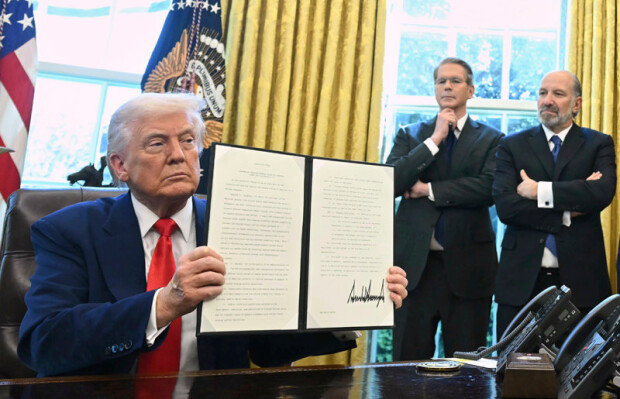Trump suspends global tariffs for 90 days
Trump suspends global tariffs for 90 days
Posted April. 11, 2025 07:28,
Updated April. 11, 2025 07:28

U.S. President Donald Trump announced a 90-day suspension of newly imposed tariffs on all countries except China — a decision widely seen as an effort to ease financial market turmoil and one that brought immediate relief to Asian economies, including South Korea.
The announcement, made on Trump’s social media platform Truth Social just 13 hours after the tariffs took effect, excluded China, where duties were instead raised from 104% to 125%.
The decision followed sharp declines in U.S. stock and bond markets, as well as global currency volatility. South Korean markets reacted positively. The benchmark KOSPI index surged 6.6% to close at 2,445.06, while the won strengthened sharply, closing at 1,456.4 won against the dollar — down 27.7 won from the previous day.
In Tokyo, the Nikkei 225 jumped 9.13%, and gains were also seen in Taiwan and Hong Kong. Mainland Chinese stocks remained largely flat, reflecting Beijing’s continued exposure to U.S. tariff hikes.
Trump admitted that concerns over bond market volatility influenced the policy shift. “The bond market is very tricky,” he said at a White House event. “I saw last night that people were getting a little queasy.” He said the decision was made “early this morning” in response to market signals.
Analysts in Seoul and Washington view the move as a tactical retreat aimed at stabilizing global markets while isolating China. “By drawing a line between China and other countries, the U.S. is signaling a willingness to negotiate — but not with Beijing,” a diplomatic source familiar with U.S. policy said.
Despite the tariff hike, Trump struck a softer tone on China’s leadership, calling President Xi Jinping “a friend” and indicating he was open to future talks. Still, he defended the increased duties, accusing China of disregarding international market rules. “The new rate has been meticulously calculated,” he said. “I don’t plan to raise it further.”
Some observers described the strategy as part of Trump’s “madman theory” — using unpredictable, high-pressure tactics to gain leverage in negotiations.
The tariff relief, though temporary, provides South Korea and other export-reliant Asian economies with a reprieve from global trade tensions. However, with the U.S.-China trade conflict escalating, uncertainty remains high for the region.
Jin-Woo Shin niceshin@donga.com







